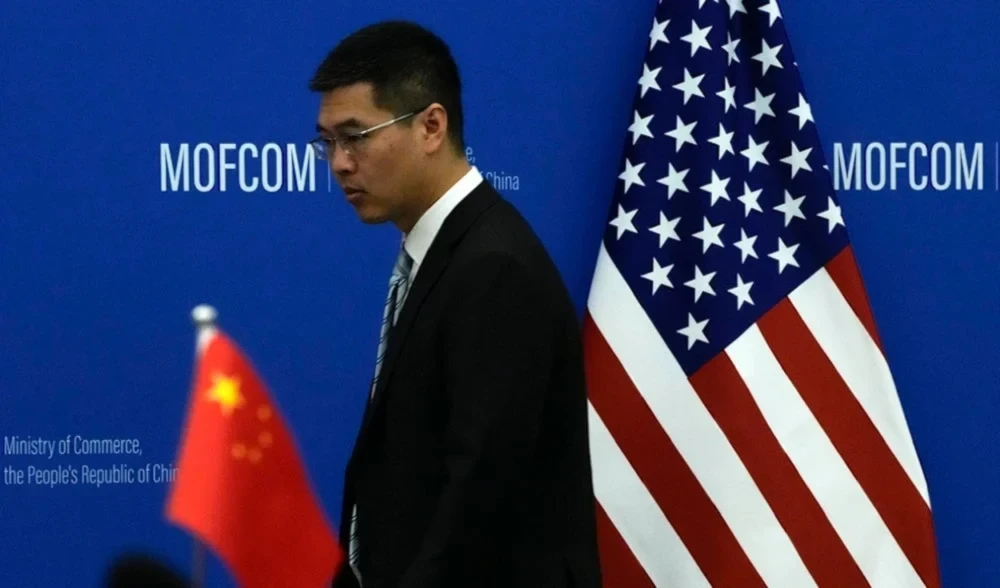China extends export ban to global companies in unprecedented move
China has taken steps to apply its domestic laws on a global scale, barring the sale of specific goods to the United States, including dual-use items and critical materials like gallium and germanium.
-

A Chinese official walks by the Chinese and US national flags at the Ministry of Commerce in Beijing on August 28, 2023. (AP)
Beijing has moved to enforce its domestic laws internationally by prohibiting the sale of certain goods to the United States, targeting companies both within and outside China, Bloomberg reported.
In its first implementation of new export control measures, China aims to mimic the extraterritorial scope of US and European sanctions by restricting items that are either Chinese-made or contain Chinese components.
This week, China announced a ban on the sale of dual-use items to the US military, as well as the export of materials like gallium and germanium to the United States.
Dive deeper
China's Ministry of Commerce announced on December 3 that the new restrictions will apply to companies and individuals abroad. It warned that any entity or individual from any country who violates these rules by transferring or supplying Chinese-origin dual-use items to the United States will face legal consequences.
This decision marks China's first use of new controls covering items with both civilian and military applications.
Effective December 1, the regulations mirror aspects of the US Export Administration Regulations, according to a report by the law firm Covington & Burling, which noted limited details on how and when this extraterritorial enforcement would occur.
This precedent-setting move heightens tensions with the US just weeks before President-elect Donald Trump assumes office.
Why it matters
China is the leading global provider of numerous critical minerals, and its dominance has been regarded by Washington as a growing concern, particularly since it imposed initial export restrictions on gallium and germanium in 2023.
“I’m not aware of another such case under the current regulatory regime,” said Cory Combs, associate director at research firm Trivium China as quoted by Bloomberg.
“For companies, the extraterritorial application means they shouldn’t bank on any loopholes to keep supplies flowing. Simply put, companies using the affected inputs need to find alternative supplies asap,” Combs added.
These new measures expand on provisions in the 2020 export control legislation, which, according to Combs, also stipulated that the law would apply to individuals and organizations both within and outside of China.
The big picture
In recent years, China has expanded its tools to counter US sanctions and trade restrictions, introducing measures like the “Unreliable Entity List” and the “Export Control Law” in 2020, followed by the “Anti-Foreign Sanctions Law” in 2021.
Additionally, a national security law for Hong Kong was enacted, extending jurisdiction to actions taken outside of China’s borders.
Although the new rules raise concerns, “we don’t yet have a clear consensus view on how far Beijing might go to investigate or punish third countries suspected of prohibited re-exports,” said Cory Combs, associate director at Trivium China, as quoted by Bloomberg.
He added, “The language primarily serves to close the potential loophole for domestic firms to try to reroute exports as opposed to seeking a new avenue to punish third countries.”
China also appears to be leveraging the unreliable entity list to scrutinize actions outside its borders, as per the report. The government is investigating the owner of Tommy Hilfiger and Calvin Klein over allegations of boycotting cotton from Xinjiang. If the company is found discriminating against Xinjiang-related products, it could face significant penalties, including being barred from operating in China.
In response to US criticism of its export restrictions on materials like gallium, Ministry of Commerce spokesperson He Yadong defended China’s actions. He argued that the “US has abused export control measures,” accusing it of “economic coercion that seriously harmed international supply chain stability.” He stated, “China’s move is in line with domestic law and is aimed at safeguarding the country’s security and interests.”
Exports of gallium and germanium from China to the US have already ceased as of 2024, according to Chinese customs data.
Gallium, a critical material for compound semiconductors, enhances the speed and efficiency of devices like TVs, mobile phones, solar panels, and radars. Germanium is essential for applications such as fiber-optic communication, night vision goggles, and space exploration, including satellites powered by germanium-based solar cells.
China remains the dominant supplier of these metals, providing 94% of the global gallium supply and 83% of germanium, according to a 2023 European Union report on critical raw materials.

 4 Min Read
4 Min Read








